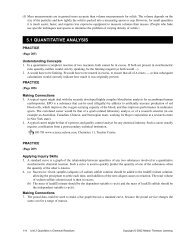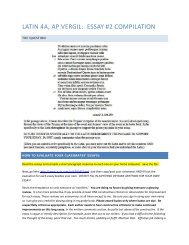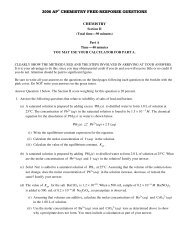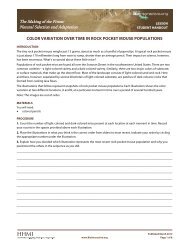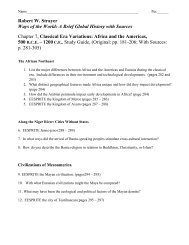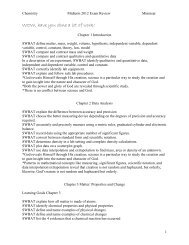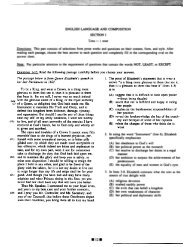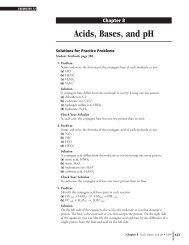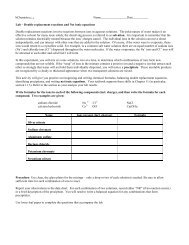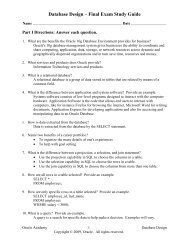Latin & Derivative* English Words – Stage 24 - Quia
Latin & Derivative* English Words – Stage 24 - Quia
Latin & Derivative* English Words – Stage 24 - Quia
Create successful ePaper yourself
Turn your PDF publications into a flip-book with our unique Google optimized e-Paper software.
<strong>Latin</strong> & <strong>Derivative*</strong> <strong>English</strong> <strong>Words</strong> – <strong>Stage</strong> <strong>24</strong><br />
(*words in <strong>English</strong> that come to us from <strong>Latin</strong>)<br />
Let’s start by looking at our vocabulary checklist first, and see what sort of <strong>English</strong> words we get from some of our chapter’s <strong>Latin</strong><br />
root words.<br />
Verbs<br />
<strong>Latin</strong> word (1 st s. present, infinitive, 1 st s. perfect, perfect participle) <strong>English</strong> meanings Some <strong>English</strong> derivatives (if any)<br />
comprehendo, comprehendere, comprehendi, comprehensus to arrest, grab, seize comprehend, comprehension<br />
conscendo, conscendere, conscendi, conscensus to climb on consensus<br />
descendo, descendere, descendi, descensus to climb down, come down descend, descent<br />
desero, deserere, deserui, desertus to desert, leave behind desertion, deserter<br />
oppugno, oppugnare, oppugnavi, oppugantus to attack pugnacious<br />
patefacio, patefacere, patefeci, patefectus to reveal patent<br />
transeo, transire, transii, transitus to cross transit, transpire<br />
Nouns/Pronouns<br />
<strong>Latin</strong> word (Nom. s., Gen. s, gender.) <strong>English</strong> meanings Some <strong>English</strong> derivatives (if any)<br />
auctorias, auctoritatis (f) authority authorize, author, authorization<br />
carcer, carceris (m) jail, prison incarcerate, incarceration<br />
colloquium, colloquii (n) talk, chat, conversation colloquial, colloquium<br />
eques, equitis (m) horseman, cavalry equestrian<br />
flumen, fluminis (n) river flume, flue, fluid<br />
pons, pontis (m) bridge pontoon, pond<br />
ripa, ripae (f) river bank<br />
verum, veri (n) truth verify, verily<br />
Adjectives<br />
<strong>Latin</strong> word (masc., fem., neut.) <strong>English</strong> meanings Some <strong>English</strong> derivatives (if any)<br />
audax, audax, audax (Gen. – audacis) bold, daring audacious, audacity<br />
egressus, egressa, egressus having left, gone out egress<br />
infestus, infesta, infestum hostile infestation, infest<br />
passus, passa, passum having suffered passion<br />
perfidus, perfida, perfidum treacherous, untrustworthy perfidy, perfidious<br />
tristis, tristis, triste sad<br />
Adverbs<br />
<strong>Latin</strong> word <strong>English</strong> meanings Some <strong>English</strong> derivatives (if any)<br />
humi on the ground inhume, exhume<br />
interea meanwhile<br />
nusquam nowhere<br />
tantum only<br />
Prepositions<br />
<strong>Latin</strong> word <strong>English</strong> meanings Some <strong>English</strong> derivatives (if any)<br />
cum when (can also sometimes mean “where”)<br />
Conjunctions<br />
<strong>Latin</strong> word <strong>English</strong> meanings Some <strong>English</strong> derivatives (if any)<br />
neque...neque neither....nor
<strong>English</strong> via <strong>Latin</strong> – <strong>Latin</strong>’s Influence on <strong>English</strong><br />
Some common <strong>Latin</strong>-based legal words and terms used in <strong>English</strong><br />
Many of our words used in the world of law come from <strong>Latin</strong> (in fact, the word “justice” comes from the <strong>Latin</strong> noun iustitia (justice)<br />
and iudex (judge). The Founding Fathers looked back to the days of the Roman Republic for many of the United State’s concepts of<br />
justice and the law. Below are just a few words and phrases used in legal professions today that come from <strong>Latin</strong>...these are terms that<br />
all lawyers in most Western countries must learn to be able to practice law at all.<br />
<strong>Latin</strong> Legal Phrase used in the law What it means!<br />
prima facie (“on the face of it”) denotes evidence that proves a certain point –<br />
usually the first bit of evidence introduced in a trial<br />
Tort (“from the <strong>Latin</strong> verb torquere – to turn, twist, bend) a civil and/or criminal wrongdoing that is legal grounds<br />
for bringing a lawsuit against someone<br />
ex parte (“from one party) a decision made by a judge without requiring all the parties involved to<br />
be present<br />
ex post facto (“from something done afterwards” ) a law or decision that changes the legal consequences of<br />
actions that have already been committed. These laws are seen as<br />
unusually harsh and undemocratic.<br />
amicus curiae (“friend of the court”) Someone who is not involved in a particular court case<br />
but that is allowed by the court to advise it on a matter of law directly<br />
affecting the case.<br />
de minimis (of little importance”) something so unimportant in difference that the court does not even<br />
take it into consideration<br />
habeas corpus (“you must have a body”) legal principal that states any person arrested has a right to be brought<br />
physically in front of a judge.<br />
in camera (“in secret”) When, for some reason, a trial or hearing must be closed to the public.<br />
in loco parentis (“in place of a parent”) A person who, although not a parent, has the responsibility and<br />
authority of a parent.<br />
non est factum (“it is not the deed”) A plea that a person who has signed up to a deed or a contract lacked<br />
the necessary understanding or intent, and is therefore not bound by the<br />
document




